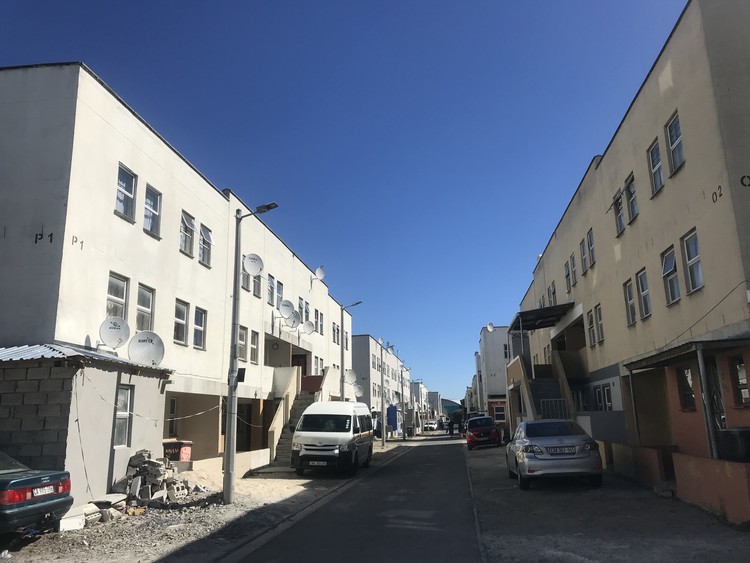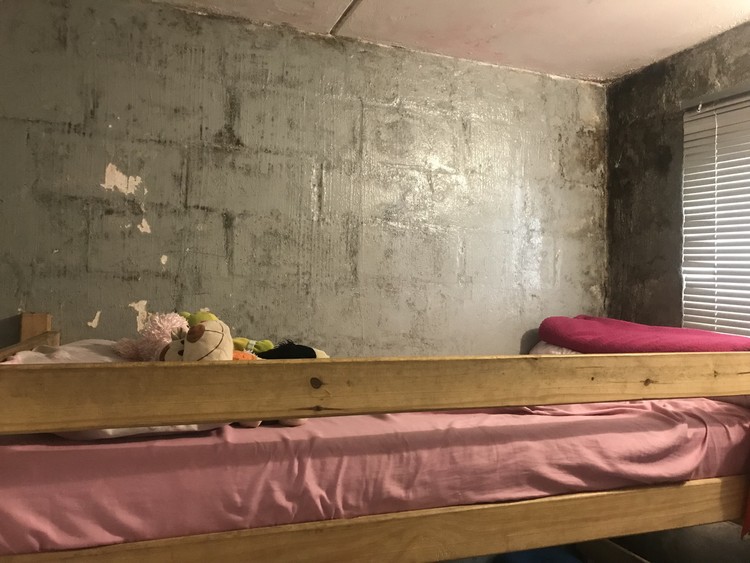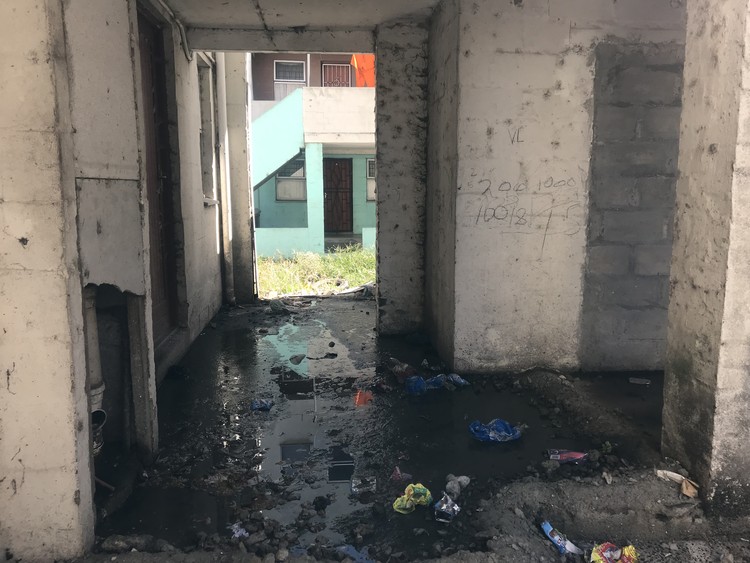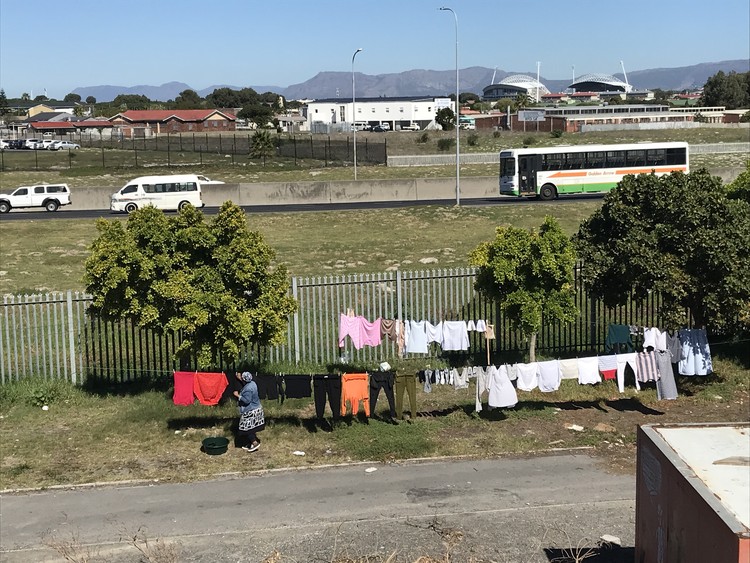Tenants of flagship Langa housing project mark township centenary in squalor
But the City of Cape Town says tenants of the N2 Gateway flats have refused to sign lease agreements, making maintenance impossible
People living at the N2 Gateway Project flats in Langa, Cape Town, are demanding that their homes be fixed and maintained. But the municipality says most tenants are refusing to sign lease agreements, preventing the City from doing repairs. Photos: Tariro Washinyira
- Tenants of the N2 Gateway Project flats in Langa say their homes were shoddily built, and have leaks, mould, pools of sewage and rats.
- The City of Cape Town, which manages the flats, says national and provincial housing departments were responsible for the building. But the provincial housing department refers questions back to the City.
- Many tenants have refused to sign new leases until the flats are fixed, but the City says maintenance cannot be done until the leases are signed.
Cracked walls, leaking ceilings, no ventilation and spreading mould are a few of the problems facing families living at the N2 Gateway social housing flats in Langa.
“Children can’t play outside because of overflowing sewage. We need to know the long term solution for these flats,” says Amanda Ntshenge, who has lived there since 2006. She and other residents say the flats are infested with rats, the fire extinguishers don’t work, the plumbing is poor and there are other defects.
The blocks of flats are home to about 5,000 people. The project was a joint initiative by provincial and national housing departments.
The flats have since been taken over by City of Cape Town and tenants have been asked to sign new lease agreements. But many have refused, saying they want the defects fixed first.
According to a 2009 report by the Parliamentary Monitoring Group, the N2 Gateway project was developed through Thubelisha Homes — a low-cost housing agency — which closed down on 31 July 2009 following “under costing and its involvement in the N2 Gateway Project, which was dogged with political problems”.
The report stated that residents were boycotting rent, claiming that it was exorbitant, and had marched in protest. MPs noted then that there had been many complaints of defects in the rental units, and asked whether these had all been identified and corrected.
Prince Xanti Sigcawu, the regional general manager at Thubelisha Homes, told MPs at the time that a survey done before the units were completed indicated that they would cost between R160 and R650 per month. But once the flats were completed, the rental amounts were raised to between R500 and R1,200 per unit.
Resident and community leader Amanda Ntshenge says she was excited when she moved into her home in 2006, but months later she started noticing serious structural problems.
Ntshenge says local and international engineers have inspected the buildings and warned that a disaster is looming. “Cape Town Mayor Geordin Hill-Lewis and the Public Protector’s office officials visited in March last year. They witnessed the conditions we are living in,” she said.
Many of the walls in the flats are covered in mould. Residents are demanding the units be upgraded before they pay rent.
“Some people are extending their flats without the City’s approval. They are building on top of water pipes and tampering with electricity cables. This has been affecting water flow. So there are families who didn’t have water for two weeks or went without electricity for eight weeks,” said Ntshenge. She said residents buy electricity but water is free.
Ntshenge said residents have had countless community meetings and meetings with Western Cape Human Settlements officials, but to no avail. She said she and other residents stopped paying rent in 2007. “We don’t have a problem with paying rent, but we want to rent a place that is well built, safe and maintained.”
Sibulele Mome, who lives with her three young children, said her biggest challenge is mould and water leaks. “My children are always sick.”
Mome said due to shoddy plumbing, the bathroom in the unit above her flat constantly leaks into hers. “I have that bucket on the wardrobe to hold water that leaks from the top flat.
“The residents here have gone to the municipality to protest several times but we never received help. The mayor was in my house to see the mould but no help came afterwards. Winter is the worst. We are willing to temporarily relocate whilst they rebuild but nothing like that has ever been proposed,” she said.
Some blocks of flats are littered with overflowing sewage and broken pipes.
Madoda Cuphe said “poor workmanship, cutting corners, bypassing building regulations and specifications” had contributed to the failure of the project which should have set a standard for collaborative social housing in the city.
“People were looking forward to the N2 Gateway project and were disappointed.”
“Residents were very angry to the extent that they stopped paying rent. They are still waiting for answers on what actually went wrong. It is hazardous to let people stay there,” he said.
Government responds
In response to our questions about budgets and problems with the buildings, the City of Cape Town said it had not been directly involved in the construction of the units. The City had only provided the land, and the national and provincial government had been responsible for the construction, through Thubelisha Homes.
“For information in this regard, please approach the Provincial Department of Human Settlements,” the City said.
However, the provincial department’s Muneera Allie said in response to our queries: “Kindly note that this query should be referred to the City of Cape Town.”
“The N2 Gateway Langa rental flats was constructed in 2005 by the Sobambisana Community Developments Consortium (SCD). The SCD was appointed by the City of Cape Town for the construction of the flats. Thubelisha was appointed in April 2006 by the National Department to manage the flats. The City is therefore better placed to respond to the query.”
The City’s media office said when the flats were handed over to the City in 2013, the handover should have included a substantial budget for upgrades and maintenance, but these funds were never allocated to the City.
“There were no lease agreements, and despite numerous meetings, workshops, and requests for tenants to enter into formal lease agreements with the City, most of the residents refused to do so.”
“In December 2015, the City had no alternative but to take the necessary action to compel the residents to enter into lease agreements. Only 118 residents responded and signed lease agreements. This meant that the City could only attend to repairs and maintenance requests from these tenants.”
A woman hangs her washing outside opposite the N2 highway in Cape Town
The City said that efforts by officials to get the families in the other flats to cooperate had been unsuccessful. Attempts to complete a survey had been met with a refusal to provide the required information.
When GroundUp visited the flats on 18 April, the acting spokesperson for the Public Protector’s Office Ndili Msoki, was conducting an inspection. Msoki said the Public Protector’s Office would meet with the Western Cape government and find out why problems had not been solved.
Support independent journalism
Donate using Payfast

Don't miss out on the latest news
We respect your privacy, and promise we won't spam you.
Next: “How are we going to survive without water?” asks protesting Rhodes University student
Previous: Katlego Bereng buried in Bloemfontein
© 2023 GroundUp. This article is licensed under a Creative Commons Attribution-NoDerivatives 4.0 International License.
You may republish this article, so long as you credit the authors and GroundUp, and do not change the text. Please include a link back to the original article.
We put an invisible pixel in the article so that we can count traffic to republishers. All analytics tools are solely on our servers. We do not give our logs to any third party. Logs are deleted after two weeks. We do not use any IP address identifying information except to count regional traffic. We are solely interested in counting hits, not tracking users. If you republish, please do not delete the invisible pixel.




